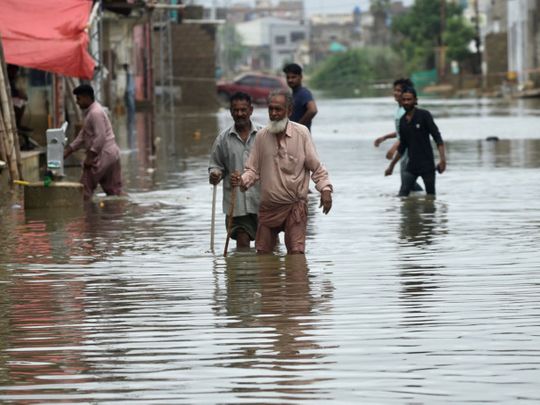
Islamabad: Devastating rains continue to batter most of Pakistan from northern to southern regions and have killed dozens this week, washed away roads, destroyed homes, and left many without power.
Pakistan’s largest city, and home to almost 16 million, Karachi suspended businesses, and public services and declared a climate emergency on Monday as torrential rains led to deadly flash flooding and infrastructure damage. The flash floods washed away bridges and submerged roads, entered houses and destroyed crops across the country. The heavy downpour also disrupted train operations countrywide and flights in some cities.
The National Disaster Management Authority said at least 312 people had died since the monsoon season began in June.
18 killed during the last days
At least 18 people were killed during the third round of monsoon rains that lashed Pakistan from Sunday to Monday. The torrential rains and urban flooding claimed 11 lives in a single day in Karachi - five people lost their lives due to electrocution while six others drowned. The city’s Quaidabad area received the highest amount of 67mm rainfall during the last 24 hours, according to Met Office.
“Karachi’s infrastructure is highly vulnerable to climate-related disasters,” according to the World Bank. Poor city management and ineffective disaster response worsen the crisis, experts say.
Devastation in Balochistan
The current spell of monsoon rains wreaked havoc in different parts of Balochistan, taking the rain-related death toll in the province to 102, according to provincial government spokesperson Farah Azeem Shah. One section of the Hub Bridge, which connects Sindh and Balochistan, also washed away in a heavy flash flood late on Monday.
Rescue and relief
Rescue agencies, as well as army and navy personnel, are assisting the local administration in flood-affected areas. The World Health Organization (WHO) has sent medicines and other equipment worth over $800 million to the health department of Balochistan to prevent the cholera outbreak in the rain-hit areas of the province.
More rains predicted
Pakistan Meteorological Department (PMD) has predicted that monsoon currents are likely to intensify in upper and central parts of the country from July 27. More rain-wind/thundershower is expected in Kashmir, Gilgit-Baltistan, Islamabad, Rawalpindi, Murree, Lahore, Abbottabad, Haripur, Peshawar, Quetta, Sukkur and other adjoining regions of Punjab, Khyber Pakhtunkhwa and Balochistan from July 27 to 31 with occasional gaps, the Met Office said.
Every year, Pakistan struggles to cope with the monsoon season from June through August, but experts say that climate change has accelerated the intensity and frequency of the downpour. Citizens mostly blame poor government planning and faulty sewerage and drainage systems for flooded streets, electrocution and loss of property during rains.











